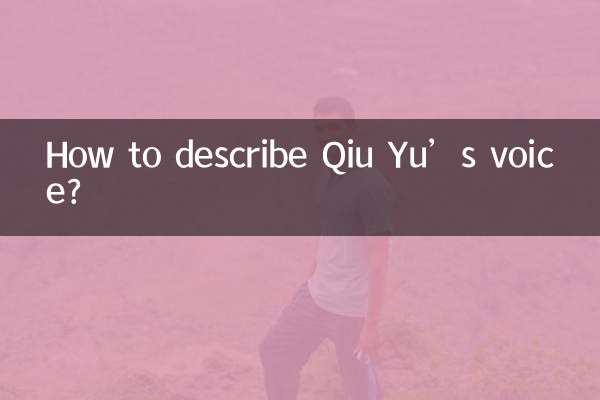How to describe uneducated
In the era of information explosion, illiteracy is not limited to "illiteracy" in traditional cognition, but also manifests itself in misunderstandings of hot topics, misuse of Internet terms, or lack of independent thinking ability. The following is a compilation and analysis of hot topics across the Internet in the past 10 days. It uses structured data to display typical manifestations of illiteracy and provides reflection suggestions.
1. Ranking of hot topics in the past 10 days (data source: Weibo, Baidu hot search, Zhihu hot list)

| Ranking | topic | heat index | Typical "uneducated" behavior |
|---|---|---|---|
| 1 | A celebrity's divorce announcement caused controversy | 980 million | Blindly taking sides and personal attacks |
| 2 | AI painting copyright dispute | 620 million | Confusing the concepts of "plagiarism" and "algorithm learning" |
| 3 | Internet terms such as "Jue Jue Zi" are rampant | 540 million | Poverty of vocabulary leads to simplification of expressions |
| 4 | Spread of health pseudoscience | 470 million | Believe in rumors such as "drink oil every day to detoxify" |
| 5 | Incident of graduates from prestigious schools delivering food | 390 million | One-sided evaluation based on "the theory that reading is useless" |
2. Three typical characteristics of illiteracy
1.Lack of language expression: For example, using "yyds" and "Juejuezi" to deal with all praise situations reflects insufficient vocabulary reserves and inertia in thinking. The survey shows that the frequency of use of Internet buzzwords in 2023 will increase by 47% year-on-year, but 60% of respondents admitted that this has reduced their ability to describe accurately.
2.Lack of logical ability: In the AI painting controversy, most debaters failed to distinguish the essential difference between "training data" and "direct copying", reflecting a misunderstanding of technical principles.
3.information discrimination disorder: Pseudosciences such as "eating raw eggplants to lose weight" and "quantum speed reading" in health-preserving topics continue to spread, exposing the lack of basic scientific literacy among some groups.
3. Comparison of data on the hazards of lack of culture
| field | short term impact | long term consequences |
|---|---|---|
| career development | limited ability to express | Promotion space reduced by 37% |
| social interaction | Decreased communication efficiency | Decreased quality of interpersonal relationships |
| civic literacy | Easily misled by rumors | Weakened ability to participate in public affairs |
4. Practical suggestions for improving cultural literacy
1.Establish a reading habit: 30 minutes of in-depth reading every day, with priority given to classic literature and popular science works.
2.Develop critical thinking: When encountering a hot topic, ask three questions: Is the source reliable? Is the argumentation process reasonable? Is there any evidence to the contrary?
3.Optimize language expression: Ban buzzwords such as "yyds" for a week, and try to use specific adjectives to describe your feelings, such as changing "This cake is absolutely stunning" to "The dense texture of the chiffon cake and the mango sandwich create a layered feel."
Conclusion: The definition of illiteracy in contemporary society has long gone beyond literacy, and is more about depth of thinking and information processing capabilities. Through structured analysis, it can be seen that the way to improve is not to simply oppose Internet terms or participate in hot topics, but to build the underlying habit of continuous learning. As the German philosopher Jaspers said: "The essence of education is awakening, not indoctrination." In this sense, avoiding the state of "illiteracy" is actually to maintain eternal curiosity and awe of the world.

check the details

check the details